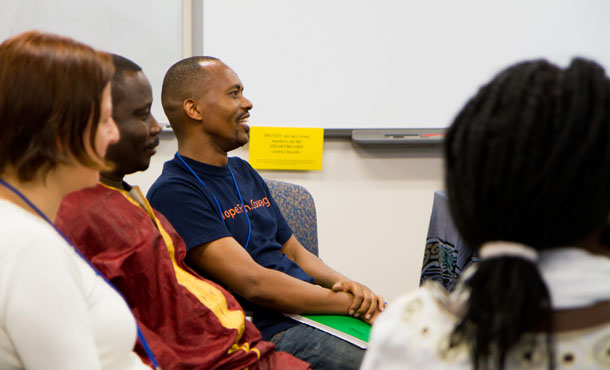Jean Claude Nkundwa came to the Center for Justice and Peacebuilding (CJP) at Eastern Mennonite University with a desire to help his country address its history of violence. Most people in the United States, when they hear about Tutsis and Hutus, think about the genocide in Rwanda, but genocide also occurred in neighboring Burundi and greatly impacted Jean Claude and his family.
Six years before he was born in 1978, Burundi experienced its “first genocide” wherein both Hutus and Tutsis participated in the killings resulting in over 100,000 deaths. Jean Claude’s mother, a Tutsi, successively lost two husbands, both Hutus, to the violence. She escaped death, but was greatly traumatized by her experiences, including temporary deportation and injury while pregnant.
People began to say that she was cursed because of marrying Hutus. Jean Claude’s father was a Tutsi, but this fact did not help his mother escape her traumas. She was an educated woman – a teacher and a journalist – but found herself unable to cope with the persecution she was experiencing. Jean Claude was sent to live with his grandfather so as to be provided a healthier home life.
Then came the second genocide of 1993. A Hutu, Melchior Ndadaye, won the first democratic election in the country, but was assassinated by Tutsi soldiers. This set off another wave of killings – over 300,000 civilians died. Jean Claude, at 15, was placed on the list to be killed by the Hutus because of his Tutsi ethnic background. Hutus scoured his home area while Jean Claude and an uncle hid in an avocado tree through the night. Jean Claude fled the next day as the violence resumed. He met two cousins, and they wandered for three days not knowing where they were going. Jean Claude and his cousins were stopped three times along the way, but they were let go. To this day, he is not sure why. He found a Tutsi army camp, where he was safe, and eventually made it to the capital, Bujumbura. Later he found out that several extended family members were killed, 45 in all in his community.
By 1994, the situation began to stabilize, though there were still tensions between the Hutu government and the Tutsis. Jean Claude began high school in 1996 – the year that his mother died – thanks to a program that provided a free high school education to victims of genocide. Friends in the peace movement helped him with the funding to obtain a bachelor’s degree in social work and community development from Hope Africa University.
His passion for peace and justice blossomed during a two-year peace education training program offered to him by Mennonite Central Committee in 2000. He decided that reconciliation with his family’s oppressors was a goal he should pursue and he visited with the Hutus who had killed his family members. He saw that they too had suffered and continued to suffer from past traumas, starvation and malaria.
Jean Claude has since served as the Burundi coordinator for the Peace and Reconciliation Program of Harvest for Peace Ministries. At a Great Lakes Region peace seminar organized by MCC, he met CJP professor Carl Stauffer, who inspired him to want to come to CJP to pursue a master’s degree.
Jean Claude began his studies at CJP in January 2012. He brought with him his wife Francine and his one-year-old son Duke. Through his studies here, he hopes to build his capacity and skills to work with civil society – churches and non-governmental organizations – to sustain peace in Burundi. He is particularly interested in transitional justice to assist his country in addressing past human rights violations in both judicial and non-judicial ways.
Article originally published in Peacebuilder magazine, Spring/Summer 2013. For a related story from the neighboring country of Rwanda, read about Steven Hakizimana, who attended the 2013 Summer Peacebuilding Institute as the recipient of the Winston Fellowship.
